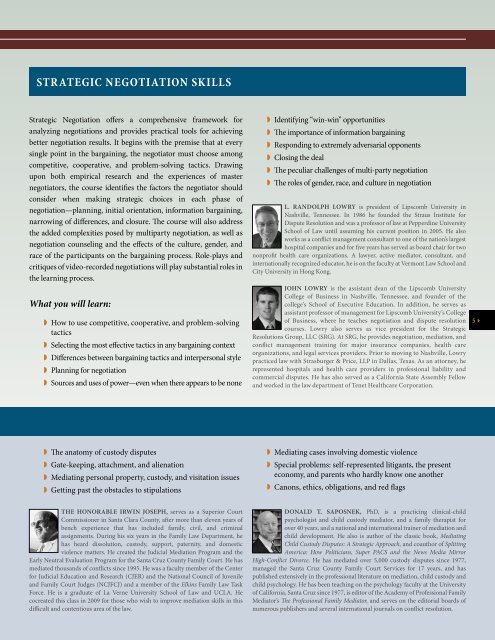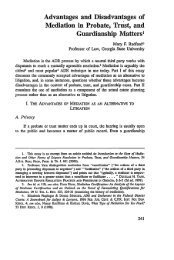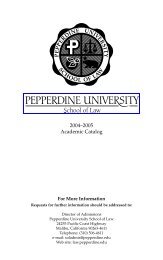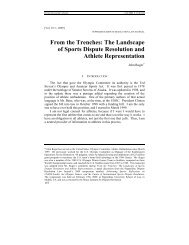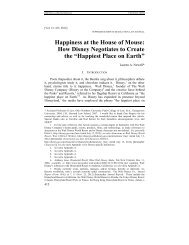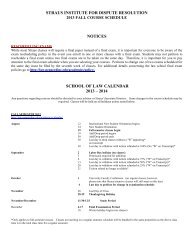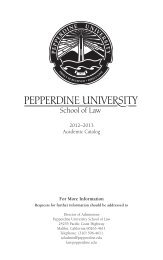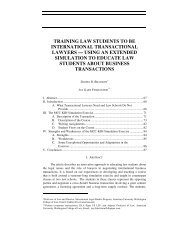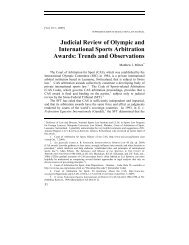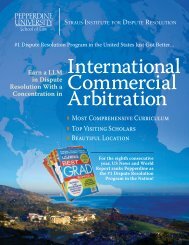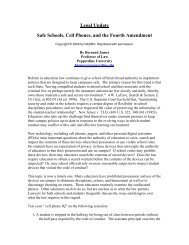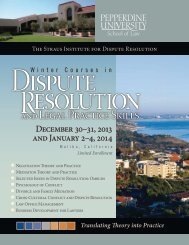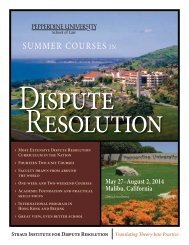Brochure - Pepperdine University School of Law
Brochure - Pepperdine University School of Law
Brochure - Pepperdine University School of Law
Create successful ePaper yourself
Turn your PDF publications into a flip-book with our unique Google optimized e-Paper software.
Strategic Negotiation Skills<br />
Strategic Negotiation <strong>of</strong>fers a comprehensive framework for<br />
analyzing negotiations and provides practical tools for achieving<br />
better negotiation results. It begins with the premise that at every<br />
single point in the bargaining, the negotiator must choose among<br />
competitive, cooperative, and problem-solving tactics. Drawing<br />
upon both empirical research and the experiences <strong>of</strong> master<br />
negotiators, the course identifies the factors the negotiator should<br />
consider when making strategic choices in each phase <strong>of</strong><br />
negotiation—planning, initial orientation, information bargaining,<br />
narrowing <strong>of</strong> differences, and closure. The course will also address<br />
the added complexities posed by multiparty negotiation, as well as<br />
negotiation counseling and the effects <strong>of</strong> the culture, gender, and<br />
race <strong>of</strong> the participants on the bargaining process. Role-plays and<br />
critiques <strong>of</strong> video-recorded negotiations will play substantial roles in<br />
the learning process.<br />
What you will learn:<br />
◗◗<br />
How to use competitive, cooperative, and problem-solving<br />
tactics<br />
◗◗<br />
Selecting the most effective tactics in any bargaining context<br />
◗◗<br />
Differences between bargaining tactics and interpersonal style<br />
◗◗<br />
Planning for negotiation<br />
◗◗<br />
Sources and uses <strong>of</strong> power—even when there appears to be none<br />
◗◗<br />
Identifying “win-win” opportunities<br />
◗◗<br />
The importance <strong>of</strong> information bargaining<br />
◗◗<br />
Responding to extremely adversarial opponents<br />
◗◗<br />
Closing the deal<br />
◗◗<br />
The peculiar challenges <strong>of</strong> multi-party negotiation<br />
◗◗<br />
The roles <strong>of</strong> gender, race, and culture in negotiation<br />
L. Randolph Lowry is president <strong>of</strong> Lipscomb <strong>University</strong> in<br />
Nashville, Tennessee. In 1986 he founded the Straus Institute for<br />
Dispute Resolution and was a pr<strong>of</strong>essor <strong>of</strong> law at <strong>Pepperdine</strong> <strong>University</strong><br />
<strong>School</strong> <strong>of</strong> <strong>Law</strong> until assuming his current position in 2005. He also<br />
works as a conflict management consultant to one <strong>of</strong> the nation’s largest<br />
hospital companies and for five years has served as board chair for two<br />
nonpr<strong>of</strong>it health care organizations. A lawyer, active mediator, consultant, and<br />
internationally recognized educator, he is on the faculty at Vermont <strong>Law</strong> <strong>School</strong> and<br />
City <strong>University</strong> in Hong Kong.<br />
John Lowry is the assistant dean <strong>of</strong> the Lipscomb <strong>University</strong><br />
College <strong>of</strong> Business in Nashville, Tennessee, and founder <strong>of</strong> the<br />
college’s <strong>School</strong> <strong>of</strong> Executive Education. In addition, he serves as<br />
assistant pr<strong>of</strong>essor <strong>of</strong> management for Lipscomb <strong>University</strong>’s College<br />
<strong>of</strong> Business, where he teaches negotiation and dispute resolution<br />
courses. Lowry also serves as vice president for the Strategic<br />
Resolutions Group, LLC (SRG). At SRG, he provides negotiation, mediation, and<br />
conflict management training for major insurance companies, health care<br />
organizations, and legal services providers. Prior to moving to Nashville, Lowry<br />
practiced law with Strasburger & Price, LLP in Dallas, Texas. As an attorney, he<br />
represented hospitals and health care providers in pr<strong>of</strong>essional liability and<br />
commercial disputes. He has also served as a California State Assembly Fellow<br />
and worked in the law department <strong>of</strong> Tenet Healthcare Corporation.<br />
54<br />
◗◗<br />
The anatomy <strong>of</strong> custody disputes<br />
◗◗<br />
Gate-keeping, attachment, and alienation<br />
◗◗<br />
Mediating personal property, custody, and visitation issues<br />
◗◗<br />
Getting past the obstacles to stipulations<br />
◗◗<br />
Mediating cases involving domestic violence<br />
◗◗<br />
Special problems: self-represented litigants, the present<br />
economy, and parents who hardly know one another<br />
◗◗<br />
Canons, ethics, obligations, and red flags<br />
The Honorable Irwin Joseph, serves as a Superior Court<br />
Commissioner in Santa Clara County, after more than eleven years <strong>of</strong><br />
bench experience that has included family, civil, and criminal<br />
assignments. During his six years in the Family <strong>Law</strong> Department, he<br />
has heard dissolution, custody, support, paternity, and domestic<br />
violence matters. He created the Judicial Mediation Program and the<br />
Early Neutral Evaluation Program for the Santa Cruz County Family Court. He has<br />
mediated thousands <strong>of</strong> conflicts since 1995. He was a faculty member <strong>of</strong> the Center<br />
for Judicial Education and Research (CJER) and the National Council <strong>of</strong> Juvenile<br />
and Family Court Judges (NCJFCJ) and a member <strong>of</strong> the Elkins Family <strong>Law</strong> Task<br />
Force. He is a graduate <strong>of</strong> La Verne <strong>University</strong> <strong>School</strong> <strong>of</strong> <strong>Law</strong> and UCLA. He<br />
cocreated this class in 2009 for those who wish to improve mediation skills in this<br />
difficult and contentious area <strong>of</strong> the law.<br />
Donald T. Saposnek, PhD, is a practicing clinical-child<br />
psychologist and child custody mediator, and a family therapist for<br />
over 40 years, and a national and international trainer <strong>of</strong> mediation and<br />
child development. He also is author <strong>of</strong> the classic book, Mediating<br />
Child Custody Disputes: A Strategic Approach, and coauthor <strong>of</strong> Splitting<br />
America: How Politicians, Super PACS and the News Media Mirror<br />
High-Conflict Divorce. He has mediated over 5,000 custody disputes since 1977,<br />
managed the Santa Cruz County Family Court Services for 17 years, and has<br />
published extensively in the pr<strong>of</strong>essional literature on mediation, child custody and<br />
child psychology. He has been teaching on the psychology faculty at the <strong>University</strong><br />
<strong>of</strong> California, Santa Cruz since 1977, is editor <strong>of</strong> the Academy <strong>of</strong> Pr<strong>of</strong>essional Family<br />
Mediator’s The Pr<strong>of</strong>essional Family Mediator, and serves on the editorial boards <strong>of</strong><br />
numerous publishers and several international journals on conflict resolution.


